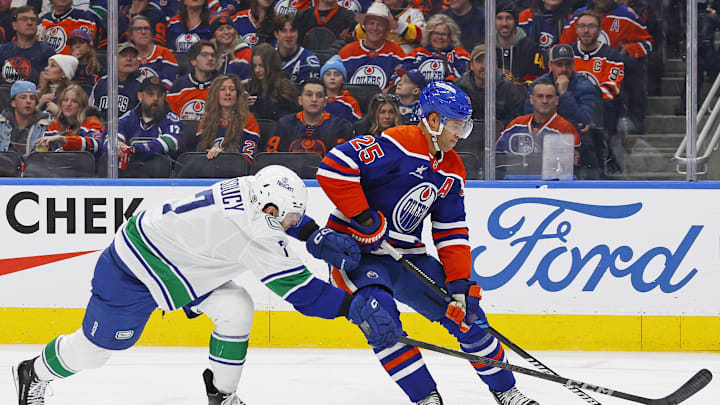With the Vancouver Canucks reportedly open to trading Carson Soucy, the Edmonton Oilers may find themselves evaluating whether the defenseman would be a good fit for their roster. Soucy, currently in the second year of a three-year, $9.75 million contract ($3.25 million AAV), provides a mix of size, defensive reliability, and playoff experience. However, acquiring him comes with both advantages and potential drawbacks. Let’s break down the pros and cons of a possible trade.
The Canucks have made Carson Soucy available for a trade, per @FriedgeHNIC pic.twitter.com/3AgYCYmlfq
— Sportsnet (@Sportsnet) February 4, 2025
Pros of Trading for Carson Soucy
1. Defensive Depth and Physicality
The Oilers have struggled with defensive consistency, particularly on the left side after losing Philip Broberg to an offer sheet. Soucy, standing at 6'5" and weighing 208 lbs, brings much-needed size and physicality to the Oilers' blue line. His ability to play a shutdown role could complement Edmonton’s existing defensive core.
2. Penalty Killing Specialist
Edmonton’s penalty kill has been inconsistent this season, and Soucy has proven himself as a capable penalty killer throughout his career. His reach and shot-blocking ability could help solidify the Oilers’ defensive play when down a man.
3. Playoff Experience
Soucy has been part of multiple playoff runs, including his time with the Minnesota Wild, Seattle Kraken, and Vancouver Canucks. With the Oilers looking to make another deep postseason push, adding a defenseman who understands playoff intensity could be beneficial.
4. Cost-Effective Contract (Short-Term Commitment)
With one year remaining after this season, Soucy’s $3.25 million cap hit is manageable, especially if Vancouver retains salary or takes back a contract in return. Unlike a rental, this deal would provide stability beyond just the current season.
Cons of Trading for Carson Soucy
1. Cap Constraints
The Oilers are already tight against the salary cap, meaning any trade for Soucy would require shedding salary. Moving out a contract like Brett Kulak’s ($2.75 million AAV) could help, but Vancouver might not be interested in taking back money.
2. Limited Offensive Upside
While Soucy brings defensive stability, he doesn’t contribute much offensively. With the Oilers’ blue line already struggling to generate secondary scoring beyond Evan Bouchard, but with the addition of John Klingberg hopefully secondary defensive offense isn't an issue. So, the defensive minded Soucy could be what is needed next.
3. Trade Cost
Vancouver, as a division rival, may not be inclined to help the Oilers without demanding a premium in return. If the asking price includes a high draft pick or a promising prospect, Edmonton may be better off looking elsewhere for defensive reinforcements.
Trading for Carson Soucy could bolster the Oilers’ defense, especially in terms of physicality and penalty-killing ability. However, given Edmonton’s cap constraints, injury concerns, and Vancouver’s potential trade demands, Ken Holland and the Oilers' front office would need to carefully weigh whether the benefits outweigh the risks. If the price is reasonable and cap space can be managed, Soucy could be a solid addition. But if Vancouver demands too much, the Oilers may need to explore other options on the trade market.
